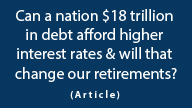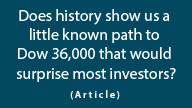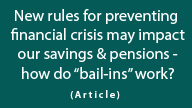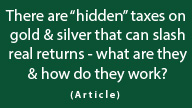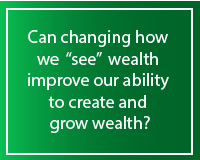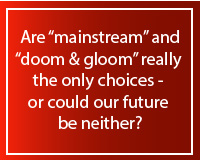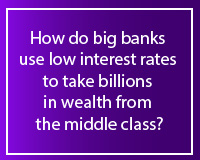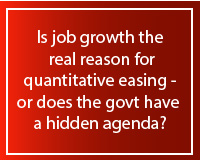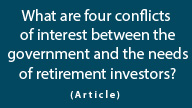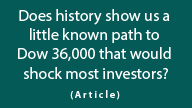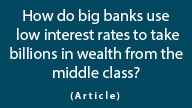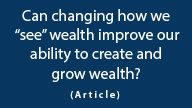Mice, Mazes & Investor Perception Management
by Daniel R. Amerman, CFA
Below is the 2nd half of this article. If you would prefer to read (or link) the article in single page form, the private one page version for subscribers can be found here:
The Conflict That Threatens Retirement Security
If you want to enjoy security in retirement, or otherwise build wealth over time, let me suggest that an understanding of the following paragraph is indispensable:
Neither finance nor economics are based on scientific "facts" like chemistry or physics, but rather each are a collection of theories. The reason for the lack of hard "facts" is that each field is ultimately about human behavior. And what is determining investment outcomes on a broad scale around the world right now could be called the clash between two great theories, neither of which the general public is particularly familiar with.
Now a clash of theories may sound a little abstract. However, there's nothing "theoretical" whatsoever about the effects of the clash of these two great theories, and why investing is currently working so differently than it was supposed to.
Just read the financial media on any given day or over the stretch of a few days. We have stock, bond and currency markets around the world that are rising and falling primarily on the words of central bankers, even as unconventional monetary policies, a.k.a. creating money out of thin air, have gone over the $20 trillion mark on a global basis.
The overwhelming majority of retirement investment planning is based upon modern financial theory. Which essentially centers around the assumption of having free markets where rational investors always determine rational and correct securities prices and interest rates. And because the past is (implicitly) assumed to endlessly repeat itself, we therefore have a "science" of wealth creation that pension funds and individual investors can rely upon. So long as the theory holds true, we can indeed have substantial control over our financial outcomes 10 years from now or 20 years from now.
There is a another grand theory which is promulgated by macroeconomists, the central banks of the world and the national governments – that is so different that it seems to describe an almost entirely different world. This theory could be called the child of Keynesian economics, and it comprises the generally accepted macroeconomic principles that are followed around the world right now.
Savers and investors play a very different role within this theory, and indeed, changing their behavior is considered an essential part of trying to manage the economy. And the methods used to induce these changes in people's behavior include deliberate perception management, as well as using a combination of positive incentives and negative incentives.
Rephrased, it's our "electric shock and cheese" analogy; we're just using a little bit different vocabulary.
Now these two somewhat contradictory theories have always coexisted in modern financial times.
Investors have always been making investments on the belief that it was the free markets that were setting prices and yields. At the very same time, the governments and central banks have been using their levers, dials, and maze design to in fact modify investor behavior, albeit in a generally much less dramatic fashion than what we have seen in recent years.
What has happened is that one of the key assumptions underlying modern financial theory – an assumption which by the way I have been in vigorous professional disagreement with for over two decades now – has in practice failed. That is, the past is clearly not endlessly repeating itself.
We had a severe financial crisis in 2008. And rather than the quick recovery that was assumed – on an economic basis – we're still in a very poor place compared to where we were expected to be.
And because of this – the relationship between those two key theories has entirely changed. The central banks and governments of the world see an urgent need to re-boot the economies, because if growth doesn't increase, then retirement security for all of us falls apart much sooner than anticipated, as explored in this article. But the methods being used haven't been working.
The central banks have stepped out from the shadows and the sidelines, and are openly making unprecedented interventions in markets in an effort to improve things.
Hence the very low and effectively negative interest rates around the world with the resulting extraordinary damage to investors, and hence the attempt to create the "wealth effect", i.e. the deliberate manipulation of investor perceptions to lure them into creating stock prices higher than they should be, for the purported good of the economy.
Now what this means is that for as long as this situation continues, modern financial theory has essentially been trumped by macroeconomic theory.
What is according to modern financial theory supposed to reliably create retirement wealth and security is not working for two reasons. The first reason is the economic growth that was built into the assumptions has not been occurring, and the theory offers no alternative source of wealth creation if that assumed economic growth just fails to occur.
Making the problem much worse from the perspective of those relying on financial theory for wealth creation, is the economists coming in and completely overriding the free market basis for their theory – cranking up the electric shock so to speak with artificial negative interest rates, even while overriding stock market prices in an attempt to induce a "wealth effect", i.e. that big pile of cheese cubes.
Now it would be one thing if that were actually working to boost the economy. But the problem is, as succinctly explained by Dr. El-Erian, or if you listen to comments by European Central Bank President Mario Draghi who's saying similar things about the European economy – those tools by themselves aren't enough to do the job. Much larger rearrangements of positive and negative incentives from the national governments are supposedly needed, which are greater than what the central banks are capable of handling themselves.
We thus have a dysfunctional economy in which interest returns have been quite deliberately destroyed as a matter of policy, even while stock market levels have been inflated to dangerously high levels as a matter of policy, even while the economy fails to reboot in response.
Seeing The Maze, Levers & Dials
So for someone who is following a traditional long-term retirement investment strategy, but who has little understanding of the modern financial theory upon which it is based, let alone any knowledge of macroeconomic theory – this becomes a very difficult and distressing situation.
They have no idea that their perceptions are being quite deliberately manipulated in an attempt to change their behavior. They have no idea that their government sometimes has conflicting interests with theirs when it comes to their investments and savings.
So when the average investor dodges the electric shocks and runs for the cheese – they may find themselves not achieving anywhere close to the results they expected, and not understanding the reasons why. That is a tragic situation that unfortunately may consume the future financial security of many millions of people.
On the other hand, for those who are open to learning new things and to further educating themselves, this same environment is ripe with extraordinary opportunities.
"Hey look, there are levers and dials. Whoa...I see how they operate, and this changes everything!"
Think about just how much easier it is to consistently and reliably reach for good investment results if you understand how the playing field actually works.
If you think that investment reality works a certain way, when in fact there's a whole different set of factors and forces that you did not understand were in play, then indeed your behavior and decisions can be influenced without you realizing what's going on, and it becomes very difficult to achieve the results that your perceptions of reality are led to believe will reliably be there for you.
On the other hand if you learn to "see" the maze, and the levers and the dials, and why they are there and how they function – subjects which incidentally are quite publicly discussed by the world's leading economists, in detail – then a whole new world of opportunity opens up to you.
One advantage in recognizing the cheese cubes for what they are when they appear, is having the option to stay away from them if you think they are an illusion that has been created to control your behavior.
And at the same time, seeing some very positive wealth creation opportunities open up.
If even low to moderate rates of inflation are used to modify investor perceptions while redistributing their wealth in a way that most people don't understand, once you see how that dial works – you can turn it to your advantage. To the extent that even a very low rate of inflation creates wealth for you, and if the inflation rate increases – so does your real wealth.
That electric shock that's zapping everybody? Plug into it, use it as a power outlet, and take advantage of that free electric power to get to where you want to go, and faster than you've ever been able to do before.
What it essentially comes down to is three things that are true simultaneously:
1) For those who are not aware of the levers and dials, in this quite dangerous investment environment there is unfortunately a very respectable chance that this surge in retirement investment confidence will... not turn out to be warranted.
2) For those who do see the maze, the dials and the levers, this is an environment of opportunity – a target rich environment for building wealth and achieving financial security. Because once we understand the dials and levers and how to take advantage of them – the game changes.
3) It is a matter of individual choice about whether to seek to understand this transformed financial world, and then whether to use that understanding to do something about it.
 What you have just read is an "eye-opener" about one aspect of the often hidden redistributions of wealth that go on all around us, every day.
What you have just read is an "eye-opener" about one aspect of the often hidden redistributions of wealth that go on all around us, every day.
 A personal retirement "eye-opener" linked here shows how the government's actions to reduce interest payments on the national debt can reduce retirement investment wealth accumulation by 95% over thirty years, and how the government is reducing standards of living for those already retired by almost 50%.
A personal retirement "eye-opener" linked here shows how the government's actions to reduce interest payments on the national debt can reduce retirement investment wealth accumulation by 95% over thirty years, and how the government is reducing standards of living for those already retired by almost 50%.
 An "eye-opener" tutorial of a quite different kind is linked here, and it shows how governments use inflation and the tax code to take wealth from unknowing precious metals investors, so that the higher inflation goes, and the higher precious metals prices climb - the more of the investor's net worth ends up with the government.
An "eye-opener" tutorial of a quite different kind is linked here, and it shows how governments use inflation and the tax code to take wealth from unknowing precious metals investors, so that the higher inflation goes, and the higher precious metals prices climb - the more of the investor's net worth ends up with the government.
 When we look at all government retirement promises over the coming decades – the total is simply unpayable. As explored in the "eye opener" linked here, this means that there is a high probability of an eventual tax code "revolution" that could rewrite all the rules when it comes to the future treatment of our current retirement accounts.
When we look at all government retirement promises over the coming decades – the total is simply unpayable. As explored in the "eye opener" linked here, this means that there is a high probability of an eventual tax code "revolution" that could rewrite all the rules when it comes to the future treatment of our current retirement accounts.







If you find these "eye-openers" to be interesting and useful, there is an entire free book of them available here, including many that are only in the book. The advantage to the book is that the tutorials can build on each other, so that in combination we can find ways of defending ourselves, and even learn how to position ourselves to benefit from the hidden redistributions of wealth.


